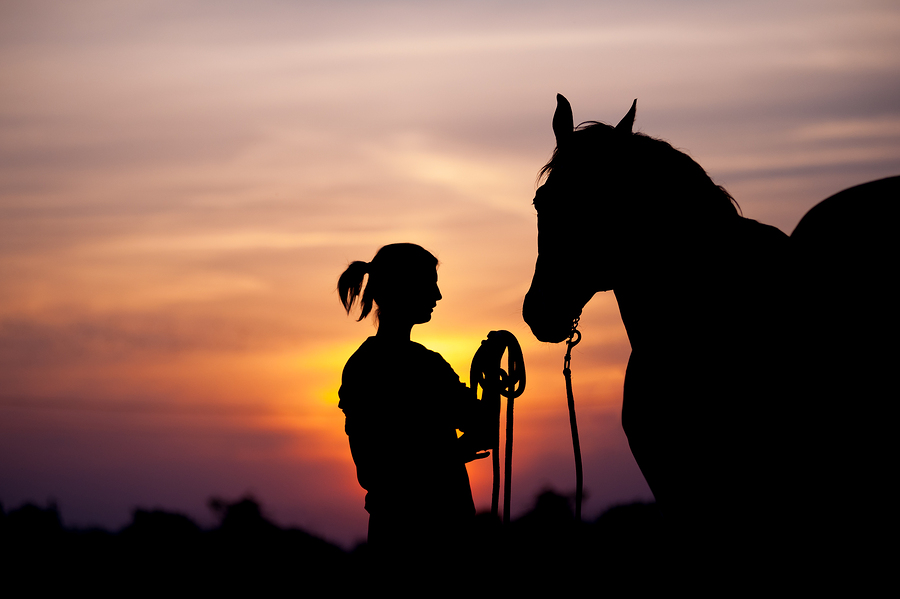Horses might be pretty big creatures, but in their minds, they only weigh a few hundred pounds.
Before humans started breeding horses to carry and pull heavy loads, equines were much smaller. Scientists believe the first domesticated horse only weighed about half of what today’s horses weigh. But while horses’ bodies have become bigger—making them less susceptible to predators—their perceptions of danger remain the same. As big as they are, horses still feel vulnerable.
For horses, feeling vulnerable shows itself in a number of ways, including a fear of sudden noises.
Horses have a strong startle reflex, which was necessary for their ancestors to survive in the wild. Add to that an acute sense of hearing, and a noise that is barely audible to humans sounds much louder to a horse.
Imagine a herd of prehistoric horses quietly grazing on a mountainside. A lion is stalking them from behind some trees. When the lion finally leaps at the horses, the sound of his legs hitting the ground—something we humans may not even be able to detect—sends a message to the horses that they are under attack. Their response is to spin, bolt and run as fast as they can. They don’t have time to think.
Modern horses still have that same flight instinct as prehistoric horses. When they hear a sudden noise—especially a loud one—they react with fear. From their perspective, the louder a noise, the closer the danger. That murderous lion might be only a few feet away.
If you’ve spent a lot of time around horses, you’ve seen this behavior for yourself. Someone drops a metal bucket on a concrete surface and the horse you are leading leaps forward. A passing car backfires and the horse you are riding does a 180-degree spin. On the 4th of July, your horse suffers a panic attack, even if the fireworks sound far away to you.
Because horses are much bigger than we are, their reactions to loud noises can be dangerous to humans in their vicinity. If you are on the ground, a horse spooked by a loud noise might run you over. If you are sitting on the horse’s back, the horse may run away with you or unseat you if he takes off in a panic.
The good news is that you can do a lot to help desensitize your horse to loud noises. Mounted police, back-country hunters, and competitors in mounted shooting events have proven that sound desensitization really works.
Getting Used to Sound
While you can’t always predict when your horse will be subjected to a loud noise, you can prepare him to deal with it when it happens. Start with a sound like a metal bucket hitting the pavement, or a metal spoon striking a metal pot. As your horse becomes used to this sound, you can gradually go to bigger noises using the same method. The loudest and scariest sound for most horses is fireworks. If your horse can learn not to react to this sound, not many other noises will scare him.
Make sure your horse is loose in a pasture or large paddock where he can’t hurt himself or others if he bolts or spins. Start by creating the sound at a low volume as far away from your horse as you can. Having someone help you is mandatory if you won’t be able to see your horse’s reaction at this stage. You need to know how your horse handles the noise from a distance.
If your horse reacts with fear to the sound—he spins, bolts or trembles—go further away or decrease the volume of the sound until your horse no longer acts afraid. Desensitization begins at the point where the animal is aware but not overtly frightened of the stimulus. If he just perks his ears but doesn’t display signs of fear, continue making the noise at this distance until he doesn’t seem to care at all. Then try gradually bringing the sound a little bit closer while monitoring his reaction. You can expect him to show alertness when the sound is closer, but if he shows fear, you need to move back to the point where he did not act afraid. Wait until he doesn’t even react with an alert expression before you bring the sound any closer. When done properly desensitization should not instill a strong fear response and should be rather boring.
Every horse is different, and some will get used to the noise faster than others. Your horse’s breed and temperament will be a factor in how quickly he acclimates. Be patient, and progress slowly as you work on desensitizing. Remember you are working to overcome many years of innate programming. Once you succeed, you’ll have a safer and happier horse.
This article was reviewed/edited by board-certified veterinary behaviorist Dr. Kenneth Martin and/or veterinary technician specialist in behavior Debbie Martin, LVT.








